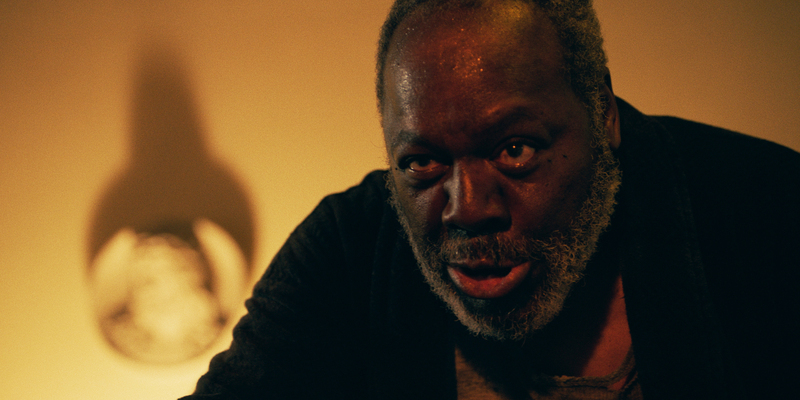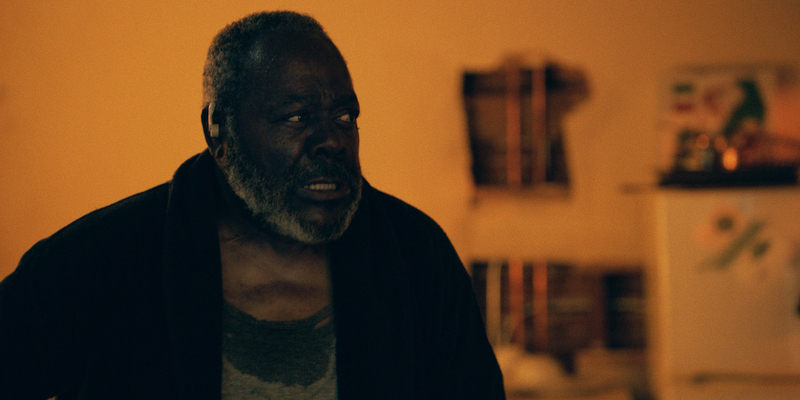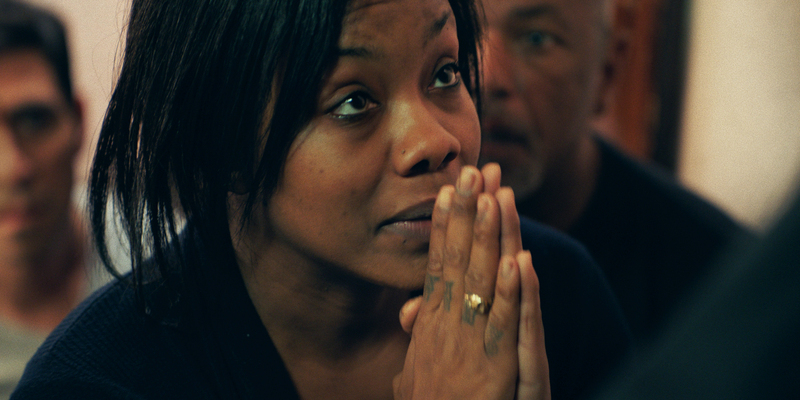
Review by
Benjamin Poole
Directed by: David Midell
Starring: Frankie Faison, Enrico Natale, Anika Noni Rose, Steve O'Connell, Ben Marten, LaRoyce Hawkins

Even during a nationwide pandemic, throughout 2021 the U.S. police force
managed to shoot 608 people dead. Or did they? Evidence suggests that,
actually, over half of police killings in the USA go unreported and that Black Americans are the social group who would be most likely to be the recipient of fatal police violence. Black America makes up 13% of the U.S.
population, but accounted for 27% of those fatally shot and killed by police in 2021. And sometimes the cops don’t just shoot these people to
death, now and again they terrorise and bully their prey until said victim
keels over from exhaustion, before opening fire on them anyway.
Take the fury inducing death of Kenneth Chamberlain, a 68-year-old
African-American ex-marine who suffered from ill health. Living alone in
public housing, Chamberlain’s medical necklace was accidentally triggered
- it sent an alert to a customer service operator, who in turn called the
Department of Public Safety. Three cops turned up, and Chamberlain
explained that the alert was a mishap, and that he was alright and did not
need assistance. For whatever reason (institutional racism, the natural
propensity for police to instil fear, or simple cruel fun?), the police
did not leave and instead threatened Chamberlain, who cowered inside on
the phone to the customer service operator, protesting that the visitors
were trying to kill him. The door was knocked down, tasers were employed
and a shotgun was used to fire bean bags. Chamberlain was eventually shot
by a handgun to the lungs. Hours later, he died during emergency
treatment.

Sounds mad, doesn’t it? But maybe these three (THREE!) men who responded
to a routine call where a pensioner tripped a medical alert were the rare
sort of good and decent policemen who deign to protect old men, firing
bean bags as part of some merry prank, tasering them to cheer them up.
Perhaps that smoking gun had a life of its own and went off in someone’s
hand. Furthermore, why would a vulnerable black man alone in an apartment
be so reluctant to allow three uniformed thugs - one of whom called him a ‘n****r’ - into his house without any witnesses? What’s he got to hide?
Look, how were the cops not to know that, perhaps, sat alone in the early
hours of the morning, Chamberlain was enacting a secret, solo crime (which
the liberal establishment has since covered up to serve its cultural
Marxist agenda)? After all, All Lives Matter, yeah??
The difficulty with reviewing
The Killing of Kenneth Chamberlain is the lack of
objectivity such a film entails, and the molten fury the events depicted
invoke; the sick sensation of helplessness stirred up as the plot
inevitably unfolds with a frustrating over-familiarity. As the three
little pigs huff and puff at Chamberlain’s door and the film effects a
cumulative dynamic of menace, this slow burn of civic brutality, you
clench your fist in anger, look away in shame. It’s only a movie, it’s
only a movie, etc. And within the medium of cinema,
The Killing of Kenneth Chamberlain may configure as part of
the home invasion genre; this sense of an implacable threat rupturing the
homestead, a sanctuary which should be safe for everyone.

The supernumerary terror is dual, however. Firstly, the police are the
very people you would hope to rely on if you were being assaulted by
aggressive ne'er-do-wells, and secondly, unlike the faux verisimilitude
which The Strangers or Them proclaim, the
portrayed proceedings in
The Killing of Kenneth Chamberlain actually did happen:
Chamberlain’s medical device recorded the entire sordid incident.
The events in themselves - of which easily accessible evidence provides a
clear consensus - are so horrifically compelling that all writer/director
David Midell needs to do is soberly represent the details and
eyewitness accounts shared in the eventual court case. His direction is
calm and precise, and there is a likewise lack of hyperbole in
Frankie Faison’s central performance (an unnecessary note is the
emotive score, the proposed manipulation of which is an unwarranted patina
to the raw action on display). The dialogue from the state sanctioned
murderers might be considered a bit on the nose - ‘[let’s] show him who’s
boss’ one of the little cowards boasts - if it wasn’t a matter of public
record. Likewise, the representation of the cops may seem a bit rote and
one dimensional, but, again, only if you could ever imagine these people
being more than the single minded, thick oppressors which current events
prove them to be over and over again.

Even though there was no discernible crime committed by the victim in
2012, a Grand Jury ruled that the murderers of Kenneth Chamberlain acted
fairly, and that ‘there was no reasonable cause’ for indictment, and it
was basically not an issue that an officer referred to the defenceless Chamberlain as ‘a n****r’. 10 years later, however, an appellate court
restored claims of non-lethal excessive force and unlawful entry in the
killing of Chamberlain. News stories such as Chamberlain are hot property
in the moment, but justice is served slowly if at all, and the news
media’s memory is short.
The Killing of Kenneth Chamberlain is an important testament
to the numerous victims of police brutality and a rigged, corrupt system.

The Killing of Kenneth Chamberlain is on Prime Video UK now.

